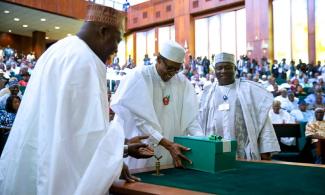
Analysis of 2017's budget with the specific focus on whether it could take the country out of economic recession.
With a view of taking Nigeria out of the economic recession it engrossed in since 2016, experts have been proffering different solutions pointing at varied financial tools. Whether a country is in an economic or financial crisis, budget, taxation, public expenditure, public works, and debts are the main fiscal policy instruments possibly to roaring out such country out of recession or depression. Out of these five strategic instruments, budget, which is divided into annual budget, cyclical balanced budget and fully managed compensatory budget by the economists, has been deployed mostly in recent times by countries that experienced Great or Minimal recession both in developed and developing countries.
As a tool for checking the fluctuations in an economy, an annual budget that would take a country out of economic recession should be pro-jobs and pro-growth not pro-investment alone. Investigation on the Nigeria’s 2017 budget reveals the contrary. Despite the benefits such as checking extravagant spending and assuring full employment without inflation, Nigeria’s 2017 budget is pro-investment not pro-jobs and pro-growth. Analysis of sentences and phrases contained in the President’s budget speech shows that more than 64% of the content exclusively focused on the government to diversify the economy or providing policies against 25% and 10.7% discourse on the needed growth and employment generation for the unemployed and those who lost their jobs at eve of the downturn.
googletag.cmd.push(function() { googletag.display('content1'); });
Annual budget which will take a nation out economic recession should be grounded on the core principle of reducing expenditure to make it balanced and full employment provision for the citizenry. Apart from these, a balanced budget needs to be expansionary. This budget is far from it. Though, annual budget meant for addressing economic recession is usually objected on the basis that adequate employment and automatic adjustment are too unrealistic in a modern economy, government needs to remove obstacles to employment generation and ensure that citizens who lost their jobs in various sectors are retrained, to enable quick recovery of the labour market that would help in creating necessary platform for the desirable growth.
This becomes imperative as the finding of the National Bureau of Statistics reveal that sharp decline in employment generation in the first quarter of 2016 is strongly correlated to the weakening economic output within the period. Nigerian government needs to learn from countries that have had an economic meltdown in the past. To fight the global recession of 2008 and 2009, the government of India responded through its monetary policy by pumping the liquidity into the system rather than using effective fiscal policy i.e. public expenditure and investment to face the recession.
googletag.cmd.push(function() { googletag.display('comments'); });
googletag.cmd.push(function() { googletag.display('content2'); });